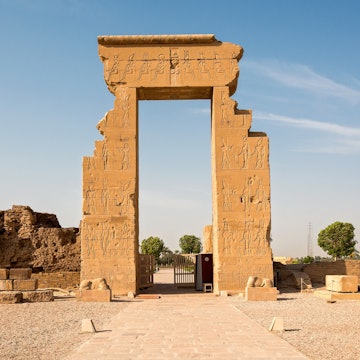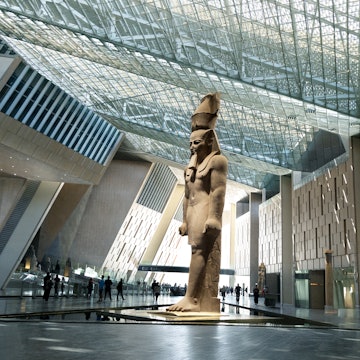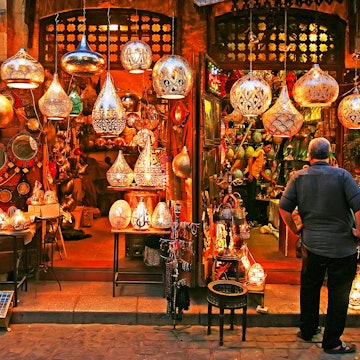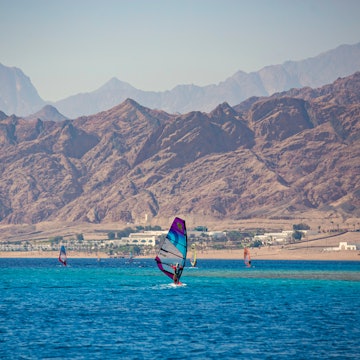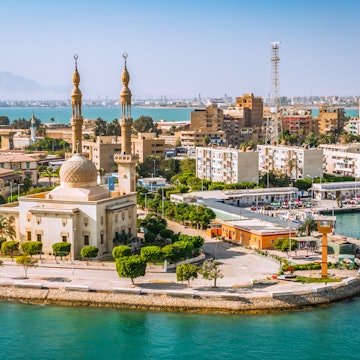
How to get your cell phone connected in Egypt: eSIMs, wi-fi and mobile networks

Feb 18, 2026 • 7 min read

Stay connected with our guide to wi-fi and mobile phone services in Egypt. Lizavetta / Shutterstock
Egypt’s rich cultural heritage and modern digital conveniences are far from being mutually exclusive. Just because Egypt is a land of antiquities doesn’t mean your experience needs to be antiquated – though we do still recommend grabbing a postcard or two for novelty’s sake. And while there are moments where you’ll want to switch off from the world and lose yourself to Cairo’s vibrant city streets, being disconnected should always be optional, not accidental.
With four major telecom providers, a variety of data plans and the growing adoption of eSIM technology, travelers have a number of options when it comes to staying connected while visiting Egypt.
Will my phone work in Egypt?
Roaming with your US carrier in Egypt can get pretty pricey. Sure, it’s convenient, but roaming packages from most US carriers can come with hefty charges and inconsistent coverage. Instead consider exploring options like local SIM cards or international eSIMs, such as Holafly, Lonely Planet's preferred e-SIM partner.
Either way, a gigabyte of data can stretch further in Egypt than you might think. For light users who just need data to refresh their inbox or avoid getting lost, 5GB will likely be sufficient for a week. If travel content creation is your bread and butter, or if you plan on streaming videos or uploading photos, 10–15GB should do the trick.

What mobile networks are available in Egypt?
Egypt has four primary mobile network operators: Vodafone, Orange, Etisalat (now e&) and WE Telecom. For the most widespread coverage and strongest 4G services, opt for Vodafone or WE Telecom. If you’re sticking to big cities like Cairo or Luxor and don’t plan on roaming off the beaten path, you can head to Orange or e& for good coverage with more competitive prices.
4G coverage is widespread, especially in major cities like Cairo and Alexandria, as well as tourist destinations like Luxor, Aswan, and across the Red Sea. Mobile internet in Egypt is generally reliable in urban areas; should you find yourself in a more rural region or somewhere in the desert, you may experience less consistent service or significantly lower signal quality.
How can I get a local SIM card?
Visitors can pick up a local SIM card at mobile provider stores, supermarkets or mall kiosks. Mobile providers also have kiosks set up at Egypt’s major airports, but it’s best to grab a local SIM card from outside the airport.
All you’ll need to buy a local SIM card is your passport – it’s that simple. Before leaving the store, test the SIM card to make sure it’s activated and has the correct amount of mobile data on it. Most providers will recommend that you download their app to track your usage and top up your account if necessary. You’ll need to enter your phone number, which you can find on the back of the SIM card package.
Is eSIM available in Egypt and how does it work?
eSIM technology has gained traction in Egypt, with all four mobile network operators offering eSIM services for compatible devices as of December 2024.
International eSIM providers allow you to activate a data plan before your arrival, which can be a great connectivity option. These plans are ready to use as soon as you land in Egypt, saving you time and ensuring you’re immediately connected so you can make it out of the airport hassle-free.

Where can I find reliable wi-fi in Egypt?
Reliable wi-fi in Egypt is truly hit or miss. For starters, wi-fi at Cairo International Airport is unreliable and often unavailable, making it difficult to depend on for your first connection upon arrival. Travelers should consider using an Egypt eSIM to set up mobile data as soon as they land, especially if those looking to use a ride-hailing app to make their way out of the airport.
While you’re out, don’t depend on the local Dunkin’ or McDonald’s for a free public wi-fi connection. Some cafes, coffee shops, and restaurants do offer free public wi-fi, but connection speeds leave much to be desired. On the other hand, if you’re in a major city like Cairo or Alexandria, you can always pop by a coworking space if you need to sit down and get connected.
Wi-fi is typically provided at most hotels, hostels and resorts. Speeds can be slower than average, especially in budget accommodations; expect better connectivity at luxury hotels, but it’s a good idea to have mobile data as a backup – especially if a constant, reliable connection is a necessity for you.
How fast and reliable is the internet?
Mobile internet is generally reliable in Egypt’s major cities and across its tourist areas. However, there may be occasional outages, especially in more remote regions or along desert highways.
In the city, mobile internet download speeds sit at around 20 megabits per second (Mbps), which is sufficient for browsing, streaming, and video calls. More isolated destinations like Siwa Oasis or the desert outskirts will have lower speeds and far spottier connections. To manage your expectations and put this into perspective: speeds in New York or Los Angeles sit well above 50 Mbps.
Having offline maps or downloaded content is a good idea if you plan to travel to less connected areas.
Are there any internet restrictions or censorship laws?
Censorship laws are nothing to worry about if you’re in Egypt as a short-term visitor. They don’t affect social media access or access to any travel-related resources you may need to navigate your way around the country. Should you happen to come upon a censored local website while in Egypt, a VPN may help.

Can I stay connected at major tourist sites?
Major tourist sites like the Pyramids, the Valley of the Kings, and Egypt’s many museums do not offer free wi-fi, so you'll need to rely on mobile data.
Will I encounter language barriers when getting connected?
A lot of people in Egypt speak quite a bit of English so there’s no need to worry about language barriers when it comes to getting connected. Most mobile operators in Egypt offer English-language websites and apps, making it easy to manage your account and track your usage. Customer support is also readily available in English, whether you’re giving customer service a call, chatting with them via the provider’s website, or you’re face-to-face with an in-store rep at most tourist-frequented locations.
How much does it cost to stay connected in Egypt?
Prepaid SIM cards are the most economical option for short-term visitors. Most providers have a travel line with data, local minutes and international minutes. For example, Orange’s Holidays Line starts at just over US$4 for 20GB of data and 120 local minutes while e&’s Traveler Visitor line gives you 7GB of data, 100 local minutes and five international calls for the same price.
You may be tempted to opt for a pay-as-you-go option with a local provider, but their units/points systems may be a bit confusing to navigate and you don’t want to find yourself overpaying or wondering why you’re suddenly disconnected and having to recharge yet again.
International eSIM options like Holafly can run around US$6 per GB, but they offer a convenient, hassle-free solution for those who prefer to set everything up before arrival.
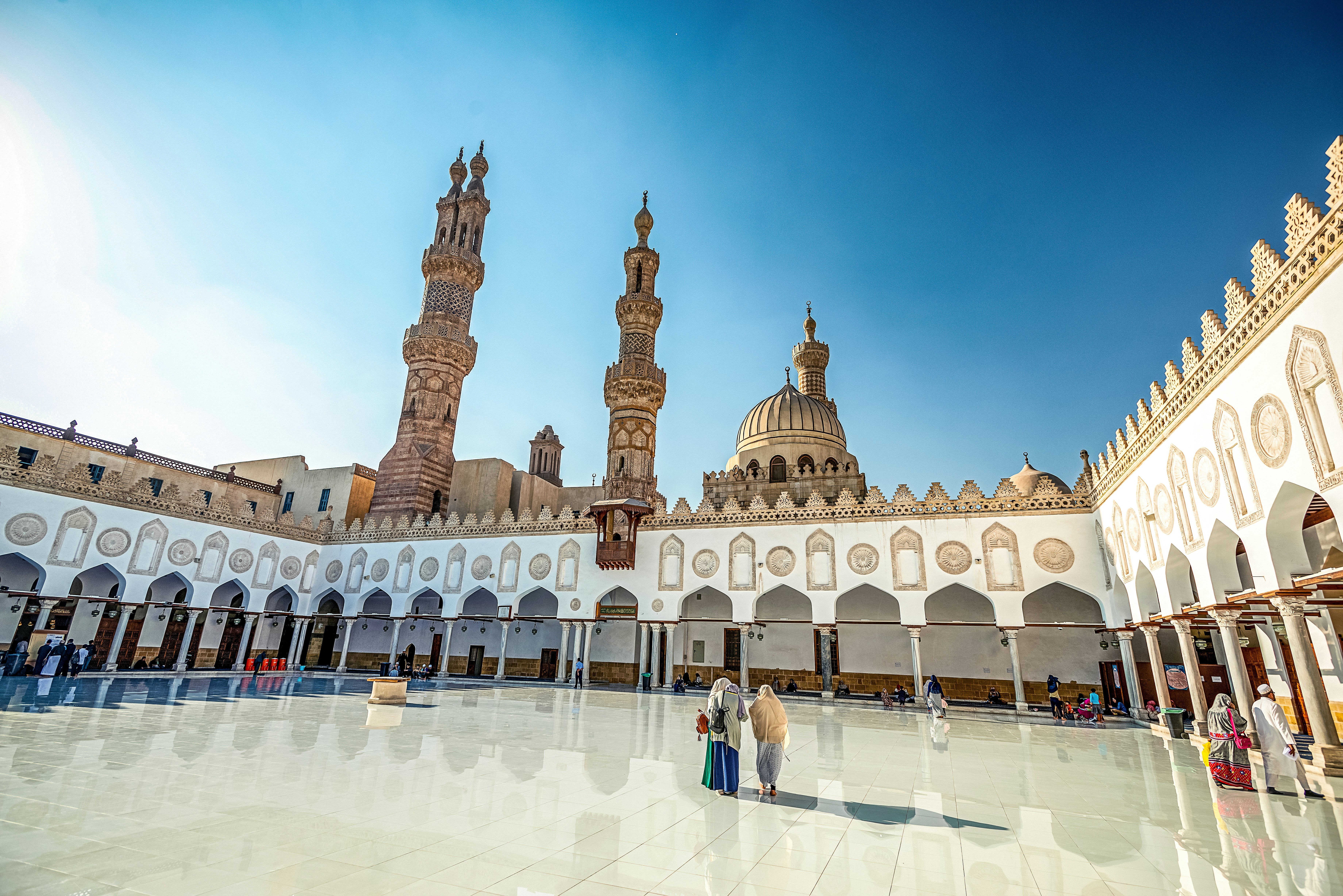
What local tech customs or etiquette should I be aware of?
Egyptians love their tech. You’ll find that just about everybody has a phone, most people are often on their phones, and many people opt out of using headphones in public spaces. You’ll want to keep it quiet if you’re visiting one of Egypt’s many mosques, as some historic mosques are still in use and it’s not appropriate to use a phone while prayers are going on. However, if you’re in there at any other time – even if there are individuals in there choosing to pray – you just need to use headphones or talk quietly.
Egypt uses plug types C and F with a standard voltage of 220V; bring a universal adapter if your devices aren’t compatible.
How do I contact emergency services if needed?
The general emergency numbers in Egypt are 122 for police and 123 for medical emergencies.
Downloading maps and using Google Translate are great ways to navigate offline and overcome language barriers in case you find yourself without an internet connection. Plus, locals are friendly and always happy to help, so don’t hesitate to ask.
Take your Egypt trip with Lonely Planet Journeys
Time to book that trip to Egypt
Lonely Planet Journeys takes you there with fully customizable trips to top destinations – all crafted by our local experts.

















